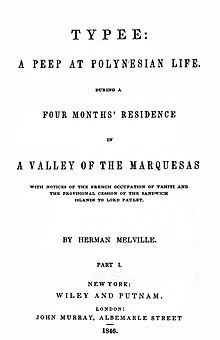Typee

First American edition title page
|
|
| Author | Herman Melville |
|---|---|
| Country | United States, England |
| Language | English |
| Genre | Travel literature |
| Published |
|
| Media type | |
| Followed by | Omoo |
Typee: A Peep at Polynesian Life is the first book by American writer Herman Melville, published first in London, then New York, in 1846. Considered a classic in travel and adventure literature, the narrative is partly based on the author's actual experiences on the island Nuku Hiva in the South Pacific Marquesas Islands in 1842, liberally supplemented with imaginative reconstruction and adaptation of material from other books. The title is from the province Tai Pi Vai. Typee was Melville's most popular work during his lifetime; it made him notorious as the "man who lived among the cannibals".
Typee is "in fact, neither literal autobiography nor pure fiction". Melville "drew his material from his experiences, from his imagination, and from a variety of travel books when the memory of his experiences were inadequate." He departed from what actually happened in several ways, sometimes by extending factual incidents, sometimes by fabricating them, and sometimes by what one scholar calls "outright lies".
The actual one-month stay on which Typee is based is presented as four months in the narrative; there is no lake on the actual island on which Melville might have canoed with the lovely Fayaway, and the ridge which Melville describes climbing after escaping the ship he may actually have seen in an engraving. He drew extensively on contemporary accounts by Pacific explorers to add to what might otherwise have been a straightforward story of escape, capture, and re-escape. Most American reviewers accepted the story as authentic, though it provoked disbelief among some British readers.
Two years after the novel's publication, many of the events described therein were corroborated by Melville's fellow castaway, Richard Tobias "Toby" Greene.
Typee's narrative expresses sympathy for the so-called savage natives, while criticizing the missionaries' attempts to civilize them:
It may be asserted without fear of contradictions that in all the cases of outrages committed by Polynesians, Europeans have at some time or other been the aggressors, and that the cruel and bloodthirsty disposition of some of the islanders is mainly to be ascribed to the influence of such examples.
[The] voluptuous Indian, with every desire supplied, whom Providence has bountifully provided with all the sources of pure and natural enjoyment, and from whom are removed so many of the ills and pains of life—what has he to desire at the hands of Civilization? Will he be the happier? Let the once smiling and populous Hawaiian islands, with their now diseased, starving, and dying natives, answer the question. The missionaries may seek to disguise the matter as they will, but the facts are incontrovertible. CH 4
...
Wikipedia
